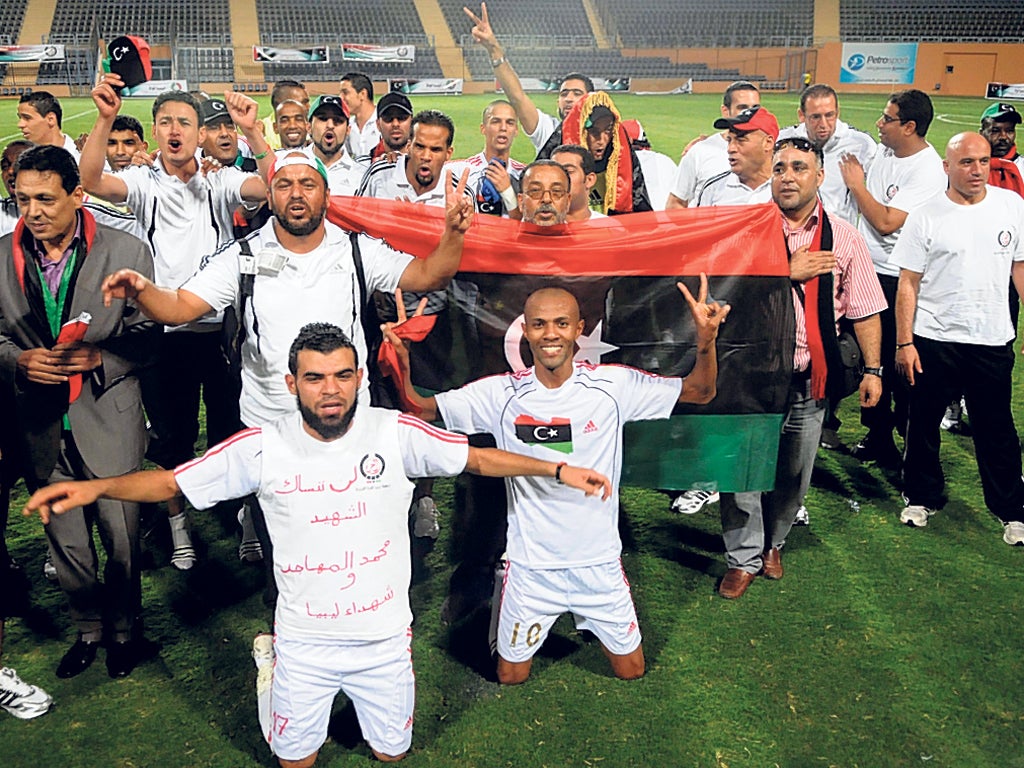'We are brothers. If we win, it will be for Libya'

Your support helps us to tell the story
From reproductive rights to climate change to Big Tech, The Independent is on the ground when the story is developing. Whether it's investigating the financials of Elon Musk's pro-Trump PAC or producing our latest documentary, 'The A Word', which shines a light on the American women fighting for reproductive rights, we know how important it is to parse out the facts from the messaging.
At such a critical moment in US history, we need reporters on the ground. Your donation allows us to keep sending journalists to speak to both sides of the story.
The Independent is trusted by Americans across the entire political spectrum. And unlike many other quality news outlets, we choose not to lock Americans out of our reporting and analysis with paywalls. We believe quality journalism should be available to everyone, paid for by those who can afford it.
Your support makes all the difference.On the face of it, 151st in the Fifa rankings against 63rd doesn't sound the most intriguing fixture with which to kick off the 28th African Nations Cup, but when Libya walk out to face the hosts Equatorial Guinea in the Estadio de Bata tomorrow evening, whatever they end up doing, it will represent another stage in an extraordinary journey.
In March last year, Libya played the third of their six qualifiers. The uprising had begun a few weeks earlier and even though they beat the Comoros 3-0 in Mali to go top of the group, nobody expected them to qualify. Inevitably, questions were asked about the war. "The whole team is for Muammar Gaddafi," said the team's captain Tariq Al Taib. "We dedicate this victory to the Libyan people who are suffering." He went on to describe the rebels as "rats" and "dogs". Al Taib isn't in the team any more. The months after that Comoros game saw remarkable changes to the team and Libya itself.
Walid Al Kahatroushi scored the opening goal in the game in Mali, but as Libya went to Comoros in June, news reached him that a friend of his, a rebel, had lost his arm in the fighting. He decided he couldn't bear to wear the Libya shirt, with its Gaddafi-era flag, so walked out, going back to Libya to join the rebels at Jebel Nafusa near the Tunisian border. Al Kahatroushi wasn't the only player involved in active combat. The goalkeeper Guma Mousa survived unscathed, but Ahmed Al Saghir was hospitalised for a month after taking a bullet in the shoulder.
A week after Gaddafi had been toppled, Libya faced their penultimate qualifier against Mozambique. The old green shirts were replaced with white ones, bearing the rebel flag. A 1-0 win prompted wild celebrations, but it meant Libya went to Zambia needing a win, while a draw might see them through, if other results went their way. Zambia probably should have won, but Libya held on, drawing 0-0, a result that, with Sudan losing to Ghana and Nigeria conceding a late equaliser at home to Guinea, put them through.
"It is important to make something for our country because for the past year we have had nothing to make us happy," said the defender Mohamed El Mounir. "Players had brothers die, their families die, so when we win it is for all of Libya, not just for us players. We have players from Benghazi, Tripoli, all over Libya; we play like we are brothers who have played for four or five years together even though some of the players are playing for the national team for the first time. But, as you see, everybody loves each other and this is good."
Join our commenting forum
Join thought-provoking conversations, follow other Independent readers and see their replies
Comments